Twin Mirror is the latest game by Dontnod, the team that was responsible for the first two Life Is Strange games as well as Tell Me Why. The main element that the four games have in common is the metaphysical factor: in the first Life Is Strange Max could manipulate time, in Life Is Strange 2 Daniel had telekinesis, in Tell Me Why Alyson and Tyler were able to communicate with their minds, and in Twin Mirror we have Sam Higgs who can enter and navigate in his own grey matter. But whereas in Max's and Daniel's cases their gifts were more or less superpowers, in Sam's case, like in Tyler and Alyson's, his ability is more like the development of a process through which he used to go from a very young age, being a lonely, marginally antisocial child with high perception, who preferred to keep to himself and seek comfort in the presence of an imaginary friend. Having the full support of his father but facing the doubts of his mother, Sam grew up as a loner, summoning his imaginary friend through a mirror every time things got tough. Soon enough, this imaginary friend crossed the line that separated him from Sam (the mirror glass) and became part of his own reality and his daily life. Being the contrary of what Sam was, the unnamed friend, who looks like a clean-cut version of Sam and is referred as "Him" in the game (for this article's consistency, by the way, I will call him Imaginary Sam from now on), would offer Sam advice on how to act and react in society, since he was a social and friendly guy who could easily adapt to any situation while, at the same time, being totally accepted by his surroundings. Except one little detail, he didn't literally exist, so it was actually Sam who, thanks to his friend's guidance, was able to go through situations that would otherwise be unbearable for him.
We do not know much about Sam's life as the game begins; we only get to know that he is a journalist who had left his isolated hometown in West Virginia a couple of years ago, supposedly because Anna, his then girlfriend, refused to marry him, and now he is on his way back to attend the funeral of his best friend Nick, who was killed in a car crash. Sam is late for the funeral, but he is in time for the wake that follows. Nick's friends and several other residents of the town have gathered to honor his memory at the local bar, where Sam finds out that he is not exactly welcome. It is revealed that two years before, Sam wrote an article in the town's paper, exposing the local mine where a severe accident had taken place, due to which the mine was soon closed. Since it was the main source of income for most of the town's residents, all the workers lost their jobs and ended up hating Sam for causing the closure of the mine. This along with Anna's refusal made Sam leave abruptly, not wanting to ever come back. At the wake, Nick's daughter, Joan, expresses her suspicions that her father's death was not an accident. Since Nick was a journalist too, Sam decides to look into the matter, sensing that his friend might have been working on exposing something big, which might prove that Joan's instinct was right.
Like in the Life Is Strange games, and also in Tell Me Why, here too the choice system is dominant and is very much connected to how Sam decides to act in accordance or not with Imaginary Sam, who, more often that not, will attempt to lead him towards the more socially accepted path. Sometimes it is his advice that is more effective, other times Sam should better follow his own instinct. Usually there is a very thin line between the two options, and picking one choice over the other may have a dramatic consequence. At the bottom of all this, however, it is actually Sam battling with himself, or rather with the version of himself that had taken shape years ago in the form of Imaginary Sam, about which path he truly wants to follow in his life.
Being social, like Imaginary Sam, feels and looks cool, but it does not always prove a good choice for the living and breathing Sam who may be an antisocial, misanthropic and cynical sociopath, almost completely void of sentiments, but is able to see through people and actions and view the world as it is, no matter how ugly it may be. Imaginary Sam is a diplomat in his interactions, while Sam is bluntly and sometimes painfully sincere. Sam does not care about being happy, therefore he does not care about getting along with other people. In reality, Sam is an unconventional human being who prefers to observe the world around him without necessarily participating in it. On the contrary, Imaginary Sam wishes to be in the company of others, even if this means burying hurtful truths and secrets. While Sam's view is more universal, Imaginary Sam is focused on the small world of Sam's circle of friends and acquaintances. Throughout his life so far, probably Sam tried to adapt to society in ways that were not fitting for him; proposing to Anna was one such instant. Anna wasn't interested in getting married, which is why she refused, but her refusal simply made Sam understand that doing what you are supposed to do is not always the correct choice.
The contrast between Sam and Imaginary Sam is highlighted by two supporting characters, Anna and Joan. Anna is more or less like Imaginary Sam; although she seems to be a free spirit, she is well-adapted in society and gets along with almost everyone she knows. Little Joan, on the other hand, is like Sam: she is an unconventional, difficult child who, however, expresses her feelings far more loud than he does. Anna and Joan, albeit in very different positions in Sam's life, are like two opposite poles. As far as Anna is concerned, Sam's decisions will not affect much his connection (or not) with her. But if in the course of the story Sam decides to follow Imaginary Sam's advice on most important dilemmas, his relationship with Joan will dramatically change, escalating into almost complete deterioration, save a small light of hope in the end. This practically means that, following the accepted path of society, Sam rejects his intuitive side, aka his inner child, which is represented by Joan in human form.
Imaginary Sam was formed in Sam's mind during an age when he felt vulnerable and helpless. Growing up, his imaginary friend grew along with him, both of them gradually distancing themselves from their common childhood. Nick was an essential part of this process, being the solid link between Sam and the world around him, especially after Sam's father died. In fact, both Sam and Imaginary Sam were able to sentimentally grow up thanks to Nick's presence. With Nick gone, Sam was thrown back to his nightmarish, lonely childhood again. Except this time Imaginary Sam was unable to accompany him there. The social, imaginary Sam had already adapted to society, while the antisocial, real Sam had bounced back to the origins of his Mind Palace. His reunion with Joan automatically connected him to both Nick and his inner child - the original self that part of him was trying to eliminate. During an important climax, Sam takes a long and painful walk in the depths of the maze of his Mind Palace and manages to reach its root: a memory of his father giving him a small tortoise made of glass. Little Sam is amazed at how clear it is and how he can see both all of it, as well as through it.
The glass tortoise clearly symbolizes Sam, how he is and how he sees the world. Like the tortoise, he has secured himself within a (metaphorical, in his case) shell, but just like the tortoise's glass substance, equally he can see both within himself (by traveling in his Mind Palace) and analyze the reactions of others so as to get to the essence of things. This becomes solid reality close to the end, when Sam has to choose between keeping or abandoning his imaginary friend. If he decides to keep Imaginary Sam in his life, he will be in good terms with most of the people around him, but he will only be able to get to a small part of the truth concerning Nick's murder. If however he chooses to say goodbye to Imaginary Sam and go on with his life on his own, he will be able to proceed much further and get to the real mastermind behind not only Nick's assassination but also a network of drug trafficking, organized by a seemingly unscrupulous resident of the town.
So does Nick become more social if he keeps Imaginary Sam in his life? Probably yes, but mostly because Imaginary Sam will always be there to guide him and point him to the "right", socially acceptable path. And does this mean that if Sam chooses to continue on his own, he will remain a cynical sociopath? Partly yes, but it seems like he has meanwhile learned a lot from his social self, and is now able to somehow adapt to his environment, albeit this may not be impressively obvious. In reality, Sam never truly lets go of his imaginary friend, he simply places him back to where he initially was, in the (literal and metaphorical) mirror of his childhood. The moment that Sam chooses the "Mind Palace" against "Him", he becomes more self-aware and ceases to depend on his imaginary friend for sentimental support and comfort, marking a coming-of-age point which, in his case, has more to do with coming to terms with his inner child and less with sentimentally growing up. Because he does need his inner child to always be there for him, but without being dominant in his adult life. Adult Sam is now far more capable to deal with the world and face it head-on, in his very own anti-social and cynical way.
Twin Mirror is fantastic as far as its metaphysical / psychological aspect goes, and Sam is a solid protagonist, presented with great precision and realism as the cold sociopath that he is. Where the game is somewhat weak is when it comes to the mystery story that backs it up, while one of the supposedly important people around Sam feels like an unnecessary addition that offers almost nothing to the development of the plot: his ex-girlfriend Anna had a lot of potential, but she appears simply as a neutral ally who could practically have been any other person in the small town. The fact that she became Nick's girlfriend during Sam's absence does not add even the slightest tension or intrigue, because on the one hand Nick is already dead when Sam returns and on the other, Sam loved his friend so much that any traces of jealousy towards him are unable to survive. This means that, on the romantic side, there is absolutely no conflict present. Not that there needed to be any romantic conflict, but its lack practically cancels Anna's role as the person who used to date first Sam and then Nick. She could have been any other friend, co-worker or whatever. She could have been a woman or a man and it would make absolutely no difference. Even her dialogue lines with Sam are neutral from that aspect, no matter whether you decide to let Sam form some kind of bond with her or not.
Joan, on the other hand, is the plot's strongest weapon. As I mentioned a few paragraphs above, the most dramatic twist that happens concerns Sam's relationship with her. With Nick gone, Joan basically represents all the things that made her father stand out, while at the same time sharing character elements with Sam. It is Joan who is the true and essential connection between Sam and Nick, and not Anna. Sam's memories that involve Anna are not always pleasant, while the memories where Nick, Joan and himself participate, are happy, careless times. Joan has less screen time than Anna (which becomes even less if certain decisions are made), but her presence never stops to loom over Sam in a rather ominous way. Joan is a constant reminder of Nick, and she is also the one who literally pointed Sam's attention into details that made him start investigating the accident that caused his friend's death. Joan is obviously a gifted, intelligent child with strong instinct; she loves bugs and even has the Death's Head Hawkmoth stitched on the back of her jean jacket. Just like Sam, Joan is unable to deal with the stagnant life of the province, but while he chose to shut himself within his "shell" and thus find a way to survive, Joan shouts and protests and makes her feelings and intentions more than clear. Joan is intuitive like Sam but has her father's gift of easily blending in society, something that she may not be fully aware of yet. In fact Sam has a lot to learn from Joan, who is like an updated version of Imaginary Sam.
As far as the other characters are concerned, some of them, like Ethan or Walter, desperately needed more screen time. Ethan especially, the barman, is a very interesting character with whom, unfortunately, you only get to talk on two occasions, and there may be a very brief dialogue scene with him much later if you choose to go for one of the bad endings of the game. Very early in the story, if you make a certain choice, Ethan will talk to Sam about his family, and in particular his sister, who has apparently left home and now lives in a commune of outcasts in the outskirts of the town. This is in fact Sam's very first hint about the case he is investigating, although at that early point in the game there is no indication of its importance. Similarly Walter, the editor-in-chief of the newspaper where Sam used to work, and where Nick also worked until his sudden death, although being a rather stereotypical character (big and loud with a heart of gold, a cat lover who adores his mother), he is presented in such a way that makes him stand out and become instantly likeable. Anna's father, Joe, is also a solid, imposing character who could probably deserve a bigger role in the game, given that he was also one of the tragic victims of the mine accident that Sam exposed in his infamous article.
With Life Is Strange 2, the Dontnod team reached a peak that is very hard - if not impossible - to surpass. Like Tell Me Why, Twin Mirror is based on an extremely interesting idea which however seems to not be fully developed, although Twin Mirror is far more complex and elaborate than Tell Me Why. Speaking of which, the mystery story that I mentioned before carries out in a rather smooth and expected way, although parts of it involve intense moments of investigation thanks to Sam entering his Mind Palace to reach certain conclusions. There are very few people involved, so you can, more or less, easily deduce who may be the culprit, even if Sam chooses to keep Imaginary Sam, and therefore leave the case partly unresolved. Regardless the investigation is simply a background story, the main and prominent theme being Sam's spiritual and sentimental development, which also happens to be the game's most interesting aspect.
Life Is Strange 2 was also about the spiritual and sentimental development of its main characters, but additionally had an intense and powerful story to back it up. Twin Mirror lacks the latter, although its "realistic" story did have potential and the game could have been much longer if certain aspects were developed more and if some characters had a bigger role in the events. For example, I would have loved to see more of Nick, either via Sam's memories or through flashbacks; and maybe get more details about Sam's obviously close bond with his understanding father. For what it's worth, Sam's father was an essential supporting figure during the hero's troubled childhood, and it looks like, after his death, both Imaginary Sam and Nick kind of replaced him in Sam's adult life.



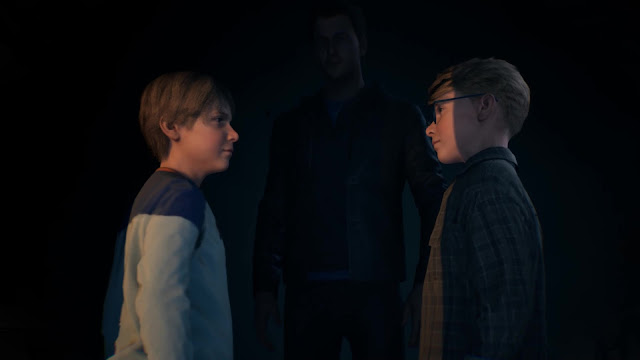



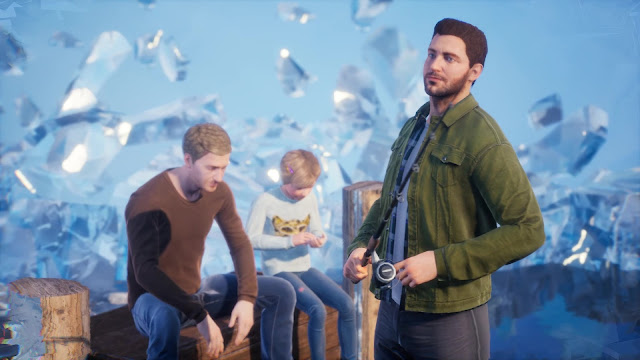
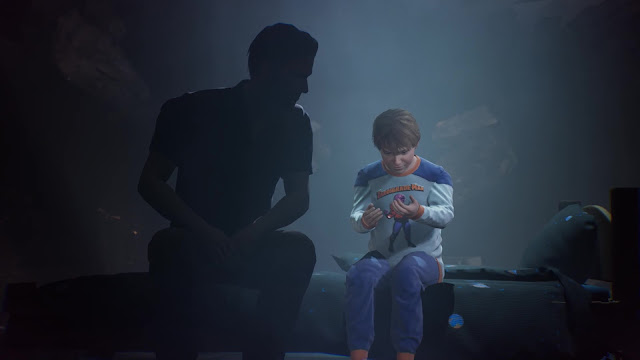
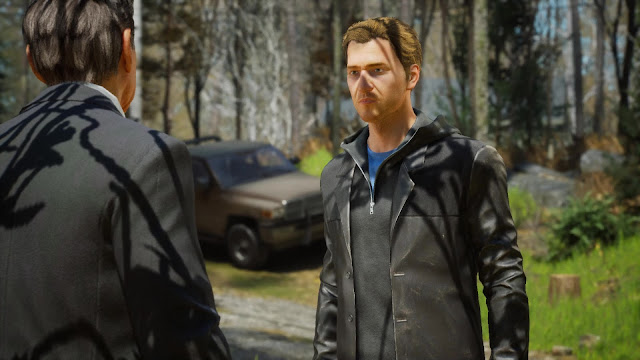
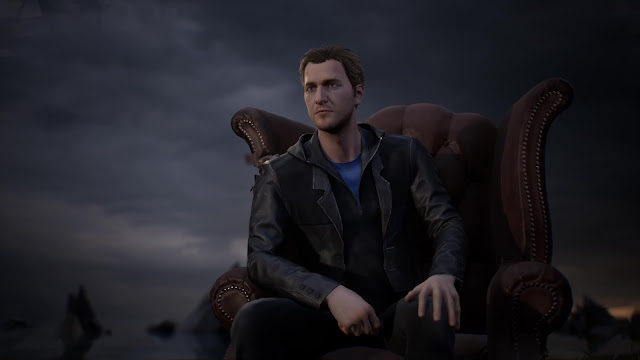


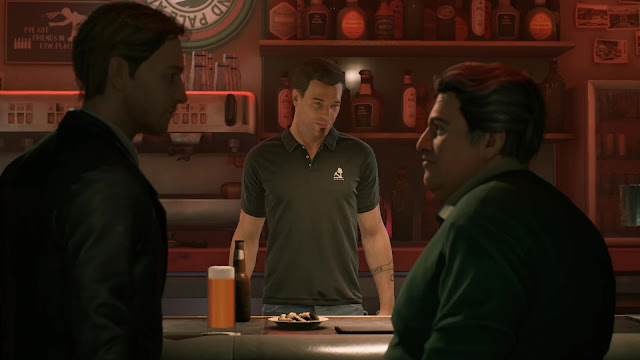
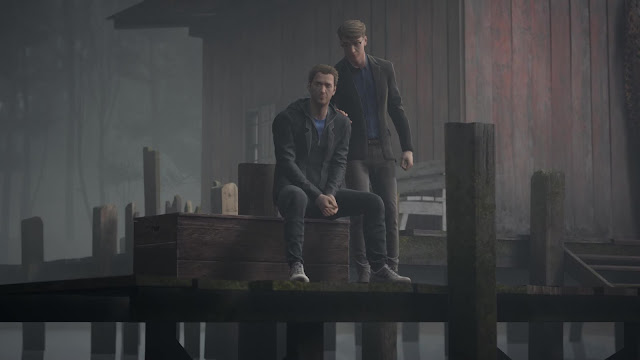
No comments:
Post a Comment